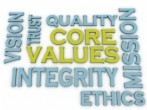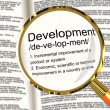 “A Silo mind-set is a mentality sometimes present in companies when certain departments or sectors do not wish to share information [collaborate] with others in the same company. This type of mentality reduces the efficiency of the overall operation, reduces morale, and contributes to the demise of a productive company culture” [1]
“A Silo mind-set is a mentality sometimes present in companies when certain departments or sectors do not wish to share information [collaborate] with others in the same company. This type of mentality reduces the efficiency of the overall operation, reduces morale, and contributes to the demise of a productive company culture” [1]
Read more …
Is a company the sum of its parts ?

It is interesting to hear people sometimes referring to their company as a person; the company did or said this, what my company has (or not) done for me, etc. But a company is not a person, it does not have self-awareness or own will, it is the individuals that make up an organization who are actually posing actions. Read more …
Corporate culture, what is it practically ?
 We often hear and talk about corporate culture but what is it practically ? What is it made of ? How does it influence the functioning of a company and how can it be changed ?
We often hear and talk about corporate culture but what is it practically ? What is it made of ? How does it influence the functioning of a company and how can it be changed ?
One way to attempt to answer these questions is to look at it from the angle of what is explicit/conscious versus what is implicit/unconscious. Read more …
Top performer or simply engaged ?

I was recently attending a business event and I was conversing with a gentleman who happened to be the head of human resources of his company, he was sharing with me that among his employees 15 percents were top performers. I happened to have in mind the statistics by Gallup[1] of the level of employees engagement worldwide (13 percents) and I was struck by how similar these two figures were … Read more …
Are your employees taking initiatives ?
 Employees may sometimes follow their own ideas or instinct. It is good to have engaged, motivated and creative people to favour innovation and progress in the company but this may also induce a problem of cohesion and coherence by preventing a concerted and guided effort towards a common goal. When a concerted effort is necessary, uncoordinated initiatives is not appropriate. Read more …
Employees may sometimes follow their own ideas or instinct. It is good to have engaged, motivated and creative people to favour innovation and progress in the company but this may also induce a problem of cohesion and coherence by preventing a concerted and guided effort towards a common goal. When a concerted effort is necessary, uncoordinated initiatives is not appropriate. Read more …
The myth of the providential man
 Enterprises are sometimes confronted with stagnating situations or projects. These situations may arise because the enterprise might not be able to address them with its own means (organization, infrastructure, methodology, people) and an external contribution is then required to improve things.
Enterprises are sometimes confronted with stagnating situations or projects. These situations may arise because the enterprise might not be able to address them with its own means (organization, infrastructure, methodology, people) and an external contribution is then required to improve things.
Do you trust your doctor ?
 We all unfortunately need to visit a doctor from time to time when we do not feel well. He examines us, he makes a diagnosis and prescribes medications. It rarely comes to our mind to ask him what is the active ingredient of the medication he prescribed to us or if he did well at school during his medical studies. Because we are not doctors, medical matters are beyond our reach and consequently we trust him if we want to be treated and cured. Read more …
We all unfortunately need to visit a doctor from time to time when we do not feel well. He examines us, he makes a diagnosis and prescribes medications. It rarely comes to our mind to ask him what is the active ingredient of the medication he prescribed to us or if he did well at school during his medical studies. Because we are not doctors, medical matters are beyond our reach and consequently we trust him if we want to be treated and cured. Read more …
The (not so obvious) path to a solution
 |
In a business context, a solution[1] is basically a set of products or services designed to meet a particular need. So looking for a solution implies to:
|
What are Soft Controls ?
 In the world of Audit[1], a Control[2][3] is basically a mechanism allowing to validate that an organization is functioning in an effective[4] and efficient[5] manner. It is also a way to reveal potential risks, areas of improvement and anti-patterns[6]. Controls allow to assess the gap between the reality and the perception we have of it. Read more …
In the world of Audit[1], a Control[2][3] is basically a mechanism allowing to validate that an organization is functioning in an effective[4] and efficient[5] manner. It is also a way to reveal potential risks, areas of improvement and anti-patterns[6]. Controls allow to assess the gap between the reality and the perception we have of it. Read more …
Employees roles and company culture
 Part of the efficiency of a company relies on the efficiency of its processes. Ideally, these processes are defined by identifying external actors (customers, providers, …) then by analysing the interaction between these actors and the company (business processes) and finally by defining how these interactions are managed and supported internally by the company (internal actors, processes and roles). Read more …
Part of the efficiency of a company relies on the efficiency of its processes. Ideally, these processes are defined by identifying external actors (customers, providers, …) then by analysing the interaction between these actors and the company (business processes) and finally by defining how these interactions are managed and supported internally by the company (internal actors, processes and roles). Read more …
Too efficient ?
 Each company is functioning at its own pace, its own rhythm. If an employee has the required abilities for his assigned role but is functioning slower than the average, he is potentially in trouble because he will most probably not be able to adapt quickly enough or to simply deliver on time.
Each company is functioning at its own pace, its own rhythm. If an employee has the required abilities for his assigned role but is functioning slower than the average, he is potentially in trouble because he will most probably not be able to adapt quickly enough or to simply deliver on time.
But when an employee is not fitting, it might well not be because he is too slow or not qualified Read more …
Is it better to be agile or flexible ?
 Being agile is to be able to move quickly and easily [1]. Being flexible is something else, it is the ability to be easily modified to respond to altered circumstances [2][3]. So if agility is about speed, flexibility is about adaptation. In a business solution [4] context, both are needed to respond effectively and efficiently to customer needs. Read more …
Being agile is to be able to move quickly and easily [1]. Being flexible is something else, it is the ability to be easily modified to respond to altered circumstances [2][3]. So if agility is about speed, flexibility is about adaptation. In a business solution [4] context, both are needed to respond effectively and efficiently to customer needs. Read more …
When methodology is diverted
 Methodology is a set of methods and procedures describing how to reach a result. Every enterprise developing products or services makes use of various development methodologies [1] but they are sometimes diverted from their original intent, for example for project management [2] purposes. Read more …
Methodology is a set of methods and procedures describing how to reach a result. Every enterprise developing products or services makes use of various development methodologies [1] but they are sometimes diverted from their original intent, for example for project management [2] purposes. Read more …
Connecting Business and IT
 There is sometimes a disconnection between the business strategy and the IT strategy of a company and that inevitably implies unexpected effects like e.g. difficulties for IT to deliver solutions in due time, on scope, on budget or with the requested level of quality. Read more …
There is sometimes a disconnection between the business strategy and the IT strategy of a company and that inevitably implies unexpected effects like e.g. difficulties for IT to deliver solutions in due time, on scope, on budget or with the requested level of quality. Read more …
The shadow of the enterprise
 The “shadow” [1] is a concept that has been introduced by Carl Gustav Jung, the father of analytical psychology. To put it simply it is not something negative, it is all that is unconscious in an individual and that drives a substantial part of his actions … This notion of “shadow” is also at work at the scale of the enterprise. Read more …
The “shadow” [1] is a concept that has been introduced by Carl Gustav Jung, the father of analytical psychology. To put it simply it is not something negative, it is all that is unconscious in an individual and that drives a substantial part of his actions … This notion of “shadow” is also at work at the scale of the enterprise. Read more …
The submerged part of the iceberg
 Every business solution [1] aims at addressing business/customer needs. So an appropriate understanding of these needs is fundamental before proceeding with a design, a development, an implementation, … In short, everything that the adopted development methodology [2] requires. Read more …
Every business solution [1] aims at addressing business/customer needs. So an appropriate understanding of these needs is fundamental before proceeding with a design, a development, an implementation, … In short, everything that the adopted development methodology [2] requires. Read more …
Let’s improve ! … but, is a framework enough ?

Every company willing to structure and improve its functioning and efficiency makes use of different types of “frameworks” or other “best practices” libraries. These frameworks prove to be very helpful because they allow to benefit from others experience, to comply to industry standards, to increase quality, customer satisfaction, etc. Read more …
Gaps in processes ?
 No process is perfect. On one hand, because it always implies a part of human intervention even when highly automated and on the second hand because sooner or later unforeseen events will occur.
No process is perfect. On one hand, because it always implies a part of human intervention even when highly automated and on the second hand because sooner or later unforeseen events will occur.
This implies that the set of predefined tasks and responsibilities (roles) of persons and systems supporting these processes is inevitably incomplete because handling unforeseen events is by definition unforeseen. So how are these “exceptions” handled? Read more …
Quid of the functional strategy ?

It is obvious that proper company management implies an optimum management of resources: people, time, money, raw material, etc. One of the means used for example by the big car manufacturers for that purpose is to avoid re-designing each new vehicle from scratch. So they design car parts, frame, engine, … which will be reused and common to several models of the range and sometimes to models of other brands. Read more …
